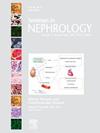Chen-Han Wilfred Wu, Yu-Ren Mike Huang, Hachem Ziadeh, Bor-En Jong, Prapti Dalal, Hsin-Ti Cindy Lin, Amar Majmundar, Yao-Chou Tsai, Adonis Hijaz, Marshall L Stoller, Michael Romero, Friedhelm Hildebrandt
求助PDF
{"title":"Genetic Insights Into Nephrolithiasis and Renal Cancer Predisposition: Precision Medicine in Genes, Diagnosis, and Therapy.","authors":"Chen-Han Wilfred Wu, Yu-Ren Mike Huang, Hachem Ziadeh, Bor-En Jong, Prapti Dalal, Hsin-Ti Cindy Lin, Amar Majmundar, Yao-Chou Tsai, Adonis Hijaz, Marshall L Stoller, Michael Romero, Friedhelm Hildebrandt","doi":"10.1016/j.semnephrol.2025.151655","DOIUrl":null,"url":null,"abstract":"<p><p>This article explores the role of genetics in kidney stones and kidney cancer predisposition, focusing on monogenic genetic causes that can be identified through genetic testing. We provide a comprehensive review of monogenic causes of kidney stones and kidney cancer as well as the current treatment options. A curated list of 64 monogenic causes of kidney stones, including 11 provisional genes, and 50 genes for kidney cancer predisposition, also including 11 provisional genes, is presented. Selected genes are discussed in detail, highlighting their clinical presentations, underlying genetic mechanisms, and available treatment options. These include gene-specific therapies, such as drugs targeting AGXT for primary hyperoxaluria type 1 and VHL for renal cell carcinoma, alongside nonspecific treatments for conditions such as Bartter syndrome and Lynch syndrome. As gene discovery continues to progress, it holds the potential to inform future preventive guidelines, novel therapeutic approaches, and precision medicine strategies, ultimately advancing the field of nephrology and improving patient outcomes. Semin Nephrol 36:x-xx © 20XX Elsevier Inc. All rights reserved.</p>","PeriodicalId":21756,"journal":{"name":"Seminars in nephrology","volume":" ","pages":"151655"},"PeriodicalIF":3.5000,"publicationDate":"2025-07-01","publicationTypes":"Journal Article","fieldsOfStudy":null,"isOpenAccess":false,"openAccessPdf":"","citationCount":"0","resultStr":null,"platform":"Semanticscholar","paperid":null,"PeriodicalName":"Seminars in nephrology","FirstCategoryId":"3","ListUrlMain":"https://doi.org/10.1016/j.semnephrol.2025.151655","RegionNum":3,"RegionCategory":"医学","ArticlePicture":[],"TitleCN":null,"AbstractTextCN":null,"PMCID":null,"EPubDate":"2025/7/15 0:00:00","PubModel":"Epub","JCR":"Q2","JCRName":"UROLOGY & NEPHROLOGY","Score":null,"Total":0}
引用次数: 0
引用
批量引用
Abstract
This article explores the role of genetics in kidney stones and kidney cancer predisposition, focusing on monogenic genetic causes that can be identified through genetic testing. We provide a comprehensive review of monogenic causes of kidney stones and kidney cancer as well as the current treatment options. A curated list of 64 monogenic causes of kidney stones, including 11 provisional genes, and 50 genes for kidney cancer predisposition, also including 11 provisional genes, is presented. Selected genes are discussed in detail, highlighting their clinical presentations, underlying genetic mechanisms, and available treatment options. These include gene-specific therapies, such as drugs targeting AGXT for primary hyperoxaluria type 1 and VHL for renal cell carcinoma, alongside nonspecific treatments for conditions such as Bartter syndrome and Lynch syndrome. As gene discovery continues to progress, it holds the potential to inform future preventive guidelines, novel therapeutic approaches, and precision medicine strategies, ultimately advancing the field of nephrology and improving patient outcomes. Semin Nephrol 36:x-xx © 20XX Elsevier Inc. All rights reserved.
遗传洞察肾结石和肾癌易感性:基因,诊断和治疗的精准医学。
本文探讨了遗传在肾结石和肾癌易感性中的作用,重点是可以通过基因检测确定的单基因遗传原因。我们提供了肾结石和肾癌的单基因原因以及目前的治疗方案的全面审查。列出了64个单基因肾结石原因,包括11个临时基因,以及50个肾癌易感性基因,也包括11个临时基因。选定的基因进行了详细的讨论,突出其临床表现,潜在的遗传机制,和可用的治疗方案。其中包括基因特异性治疗,如针对原发性高草酸尿1型的AGXT药物和针对肾细胞癌的VHL药物,以及针对Bartter综合征和Lynch综合征等疾病的非特异性治疗。随着基因发现的不断进展,它有可能为未来的预防指南、新的治疗方法和精准医学策略提供信息,最终推动肾病学领域的发展,改善患者的预后。Semin Nephrol 36:x-xx©20XX Elsevier Inc.。版权所有。
本文章由计算机程序翻译,如有差异,请以英文原文为准。

 求助内容:
求助内容: 应助结果提醒方式:
应助结果提醒方式:


